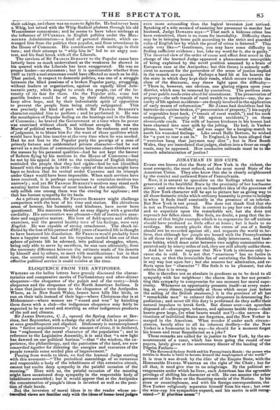JONATHAN IN HIS CUPS.
EVERY one knows that the State of New York is the richest, the most energetic, the most refined, and the most moral State of the American Union. They also know that she is closely neighboured by the convict and outlawed State of Pennsylvania.
Now, it is natural to speculate on the feelings which must be generated in the healthful State by the proximity of her loathsome- sister ; and some who have yet an imperfect idea of the greatness of the New York character will be apt to picture her as giving way to all those fantastic tricks which ordinary humanity is prone to indulge in when it finds itself constantly in the presence of an inferior. But New York is not proud. She does not thank God that she is not as Pennsylvania. She is content to pay her own dividends and to expatiate upon the remarkable act, but she does not reproach her fallen sister. She feels, no doubt, a pang that the in- fluence of that bright example which is to regenerate far-off nations should have produced so little effect at home ; but it leads to no revilings. She merely pleads that the errors of one of a family should not be recorded against all ; and requests the world to be- lieve, that although her people are bound with the Pennsylvanians in all those ties of private friendship, daily intercourse, and busi- ness habits, which must exist between two mighty communities se- parated only by ninety miles of rail, they are still utterly unlike them.
And let not men suppose that New York is virtuous only be- cause she is cold. It is not that " smartness " has no lustre in her eyes, or that the irresistible fun of outwitting the Britishera is in any way lost upon her ; but she seasons her admiration, and re- flects upon her " character"! She feels it to be pleasant, but she admits that it is wrong.
She is therefore not so absolute in goodness as to be dead to all sympathy with her neighbour : the charm lies in her not permit- ting this sympathy to compromise for one moment her moral supe- riority. Whenever an opportunity presents itself—at every meet- ing, at every dinner, (especially at those which occur just before the sailing of the British steamers,) it is the province of all her " remarkable men" to exhaust their eloquence in denouncing Re- pudiation; and never till this duty is performed do they suffer their natural impulses to break forth. But dinner over—set speeches disposed of—champagne, tobacco, and spitoons beside them—their hearts grow large, (as what hearts would not ?)—the narrow dis- tinctions of individual States are forgotten, and the New Yorker is merged in the American. What wonder if under such circum- stances, keenly alive to all its inherent drollery—for the New Yorker is a humourist in his way—he should for a moment forget his lesson and treat Repudiation as a joke ? These remarks are called for in justice to New York, by the an- nouncement of a toast, which has been going the round of our papers, lately given at the anniversary dinner of the landing of the Pilgrim Fathers- " The Reverend Sydney Smith and his Pennsylvania Bonds : the parson who dabbles in Stocks is liable to become himself the laughingstock of the world." It is true it was drunk by the elite of the Empire State, with the Honourable DANIEL WEBSTER on the right of the Chair ; but for all that, it need give rise to no misgivings. By the political ar- rangements under which he lives, each American has the agreeable privilege of shifting his character at will. He can assume the sober garment of his State or the flaunting mantle of the Nation. In his store or countinghouse, and with his foreign correspondents, the New Yorker religiously separates himself from his race ; but over the wine-cup his sympathies expand, and his motto is still recog- nized—" E pluribus wont" !


























 Previous page
Previous page